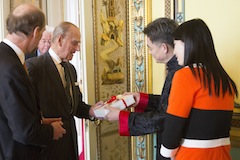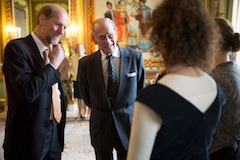| |
|
 |
PRESS RELEASE Faith leaders unite to combat illegal wildlife trade
Feb 20, 2013:
 |
 |
 |
The Duke of Edinburgh and ARC Secretary General Martin Palmer. Photographer: ARC/Matthew Lloyd |
Statements by leaders of 34 religious traditions were today presented to HRH The Duke of Edinburgh as part of a major initiative linking religions and conservation groups in opposing the illegal wildlife trade, which is annihilating the world’s rare and endangered species.
The statements were presented to Prince Philip (ARC's founder and WWF President Emeritus) during a meeting at Buckingham Palace in which he was also updated on the latest conservation initiatives undertaken by faith groups around the world.
In their statements the faith leaders, who represent Buddhist, Christian, Daoist, Hindu and Muslim communities in Africa and Asia, call upon their followers to protect wildlife and combat the trade in threatened species, saying this is a moral and spiritual issue.
They are the result of a major initiative by the Alliance of Religions and Conservation (ARC), WWF-US and faith leaders aimed at tackling the issue through education, awareness-raising and action in the key countries in Asia and Africa affected by the illegal wildlife trade.
 |
 |
 |
Prince Philip was also handed a book on the life of Confucius by Li Zhi, deputy director of the Confucius Foundation. Photographer: ARC/Matthew Lloyd |
Crucially, the partnership also focuses on undermining consumer demand in China and other Asian countries for medical ingredients or luxury items made from rare and endangered species.
'A moral and spiritual issue'ARC Secretary-General Martin Palmer said: “All faiths believe that our place in nature is to protect as much as it is to use the gifts that have been given us.
"This is why 34 major religious traditions from around the world, each driven by their own spiritual understanding of our responsibility to the rest of nature, have joined together to combat this most pressing of assaults on the diversity of nature – the illegal wildlife trade.
“This ranges from the Daoists of China working to change the mindset of those who buy traditional Chinese medicine using ingredients from threatened species, to the Muslims of Indonesia calling on the faithful to safeguard over-exploited animals such as pangolins, primates and tigers, to faith leaders in Africa speaking out against poaching. For all of them this is a moral and spiritual issue.
 |
| "The profits made from the killing of African rhinos and elephants and Asian tigers are about $10 billion each year. This is not local poaching, it is wildlife crime. It is a trade run by international crime syndicates" - Dekila Chungyalpa, WWF-US |
|
 |
 |
“This marks a new and potentially highly significant development in the struggle to preserve the great species of our planet, or, as many of the faith would put it, those creatures that most need the protection of God.”
Wildlife poaching is 'greatest threat'Dekila Chungyalpa, director of WWF-US’s Sacred Earth programme, said wildlife poaching is
not only the greatest threat to many endangered species, but has become highly organised crime, backed by international syndicates linked to gun and drug trafficking.
Illegal wildlife trade is the fifth largest illicit transnational activity worldwide after counterfeiting and the illegal trades in drugs, people and oil.
“Tens of thousands of wild elephants are being killed each year for their tusks to meet the demand for ivory coming from China, Thailand and other Asian countries,” she said. “The profits made from the killing of African rhinos and elephants and Asian tigers are about $10 billion each year.
"This is not local poaching, it is wildlife crime. It is a trade run by international crime syndicates.”
The statements by the faith leaders come ahead of this year’s CITES (Convention on International Trade in Endangered Species of Wild Fauna and Flora) conference in Bangkok where members will consider further action to combat the illegal trade in elephant ivory, tiger parts and products, and rhino horn as well as in Asian big cats, great apes and other species.
Ends
More information from the wildlife project pages.
 |
 |
 |
Prince Philip speaks to Chantel Elkin, ARC's wildlife programme manager |
Here's a brief selection of quotes from the statements and letters:“We also ask all the faithful to protect those species in our own lands that are most threatened, such as the elephant, tiger, primates, pangolins and many others, and to assist in the prevention of poaching and the illegal wildlife trade in order that on the Dreadful Day of Judgement, when the community of creatures stand before Allah, we will not be condemned by their words. The richness of this world is a gift and a blessing from Allah. May we in turn be a blessing to all that Allah has made and given to our care.
- from the statement made by the Indonesian Council of Ulema
“We call upon all Buddhists to respect the tradition of treating other sentient beings in the natural world with compassion, and to protect the big cats, as well as other species that are threatened by illegal hunting, trade and consumption.”
- from the Mongolian/Bhutanese Buddhist statement
“We must show respect and love towards the animal kingdom. Islam is against poaching, overfishing and illegal trade of the animal species. It is our duty to protect the animal kingdom instead of destroying it so that our future generations can benefit from what wildlife can offer to this world.”
- Sheikh Dr Muhammad Ridwaan Gallant, Muslim Juducial Council, SAFCEI
“We call upon all Christians, but especially those of our tradition, to protect the gifts of God in nature. In particular, in this time of deep crisis of creation, caused by human folly and sin, we ask all Christians to protect and defend our most endangered species in Africa, such as the rhinoceros, gorillas and the elephant. As Christians we can defend these fellow creations of God through preventing poaching, refusing to participate in any illegal trade and in bringing to justice, both human and divine, those who seek to destroy that which we know God loves.”
- Rev Edward M. Matuvhunye, United Church of Christ in Zimbabwe
“One of Daoism’s great gifts to the world is Traditional Chinese Medicine (TCM). TCM plays an important role in caring for our health but when it endangers the natural world it is no longer in alignment with Daoism’s spiritual principles… We ask all suppliers, practitioners and consumers of traditional medicines to protect and care for plants, insects and other creatures, especially endangered animals, and to refrain using them in TCM.”
- China Taoist Association
“In the 21st century, the role of religious leaders must expand to include exhorting their followers to live mindfully, consciously and in accordance with a sustainable future. They must emphasize to their followers the importance of protecting and preserving our Earth’s natural resources. In a country where we pray for peace to the atmosphere, peace to the mountains, peace to the rivers, peace to all creatures and peace to all people, we can show the world how protecting the environment for our worldwide family is truly the key to having a peaceful tomorrow.
- His Holiness Pujya Swami Chidanand Saraswati, President of Parmath Niketan, Rishikesh, India
Buddhism teaches equanimity. We have to show compassion to all sentient beings. All life is equally sacred. Lord Buddha himself in a previous life gave his body to feed a hungry tigress. … In the start of this new year, Year of the Tiger, I request all of you to avoid eating, using or wearing any products that may contain tiger parts and to do what you can to prevent illegal wildlife trade from happening.
- His Holiness, the 17th Gyalwang Karmapa Ogyen Trinley Dorje, Karma Kagyu School of Tibetan Buddhism
|
 |
 |
|
|
|
|
|
 |
February 7, 2013:
Religions belong at the forefront of environment and wildlife protection
The crucial role played by faith leaders in protecting wildlife, biodiversity and the environment has been recognised in a major interview in New Scientist magazine. |
 |
Wildlife and Forests
Every faith teaches us about our relationship with the natural, wild world. This is why wildlife programmes are a particularly important area for ARC. |
 |
Vision and Strategy
ARC's vision is of people, through their beliefs, treading more gently upon the earth. Link here to find out how we achieve this.
|
 |
 |
|
|

